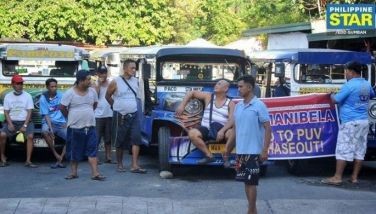Human trafficking on the rise, with easy pickings in the Philippines
MANILA (AFP) - Trafficked into slavery as a young girl, Geralyn Quezo, 17, sits quietly by the window of a halfway house amid the deafening cacophony of life in Manila's main pier.
Now and then a smile breaks from her cracked lips, only to quickly fade as memories of her ordeal come flooding back in a wild see-saw of emotions.
"I am now free. But now I do not know what to do," she told AFP at the Bahay Tuluyan refuge for rescued victims of human trafficking on a busy roadside at Manila's North Harbor.
A distant relative had duped Quezo's father into allowing her to travel with him to Manila when she was barely 12, supposedly for a leisure trip. That hot summer day was the last time she saw her family in impoverished Muslim Mindanao.
The relative turned out to be a broker for a human trafficking syndicate, but decided to keep Quezo as his personal slave. For three years, the young girl worked for him as a cook, nanny and maid -- and was not paid a cent.
She thought her parents had given her up for dead and it was not clear why they never made the trip to Manila to search for her.
"Perhaps they did not have money. We lived on a remote farm, and we lived a day to day existence," Quezo said. "They may have given me up as a lost cause because I had many other siblings they needed to feed."
She lost all contact with the outside world, she said, and would cringe at the sound of passing vehicles. At night she would curl up in a corner and cry herself to sleep.
Then one day, her captor forgot to lock the gates and Quezo escaped, only to end up lost in the dank alleys of Manila's slums, working odd jobs that paid enough to buy food and the clothes on her back.
She later met social workers who referred her to the Visayan Forum Foundation, a non-government organisation that works to combat trafficking and which runs the halfway house.
Quezo is now rebuilding her life, learning livelihood skills that should help her reintegrate into society. She remains hesitant about going home, fearful of her parents' reaction.
"I don't know if they would still remember me. I only have a vague memory of their faces," she says.
Sad as Quezo's case may be, it is an increasingly common one in the Philippines, which international advocacy groups say has in recent years become a major source of cheap illegal labour in Asia.
Human trafficking has also become the dirty secret of economic expansion, with many criminal organizations preying on unsuspecting rural families who send their young children off on false promises of money and prosperity.
Often, they end up in the hands of illegal recruiters who sell them as virtual household slaves.
Many end up in suburbs around Manila, working in clubs and bars or forced into slavery, said Marina Ullegue, who runs Bahay Tuluyan.
"Many think that once they get to Manila, they will end up shoveling money on the streets before going abroad. The sad reality is that they end up being trafficked and abused," she said.
There have been cases of Filipinas trafficked to Europe and Africa, where they ended up working in brothels.
In one celebrated case, a group of Filipinas recently rescued from the Ivory Coast said they thought they were in France.
Ullegue said: "It is easy to lure these mostly uneducated people to leave their rural homes, and traffickers know how to make a pitch."
Many of those rescued by the foundation at first were distrustful and angry that they were being prevented from earning money they could send home, she said.
"The emotions are so high because they want to help their families, but many do not realise that they have fallen in the net of recruiters."
Bruce Reed, the International Organisation of Migration's (IOM) regional representative in Southeast Asia, said human trafficking has become a major policy challenge for governments in Asia.
He said many victims are trafficked domestically within Asia, although there has been a rising trend of shipping people across continents.
"The causes of trafficking in the region are rooted in poverty, limited educational and employment opportunities," Reed told a recent forum in Manila.
"We all can cite instances where the demands for labour outstrip the legal sources of supply, creating opportunities for traffickers to step into the breach," he said.
In the Philippines, while there are no figures, internal trafficking has become a "lucrative underground economy," the Visayan Forum said.
"The demand for human commodities in brothels, sweatshops and even in households is evident," it said in a recent study.
The study said Manila remains a major exit point of trafficking to other countries as well, although the porous southern border in the Zamboanga peninsula is also widely used as a jump-off point for undocumented Filipinos heading for nearby countries.
- Latest
- Trending
































